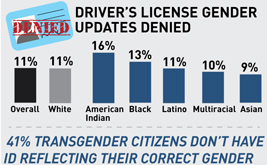‘True the Vote’ Still Out to Screw the Vote ‘True the Vote’ Still Out to Screw the Vote
If so many people believe voter fraud exists, it’s because groups like this have spread myths while suppressing the truth.
May 1, 2012 / Brentin Mock
People of Color Less Likely to Vote Because of Super PAC Influence People of Color Less Likely to Vote Because of Super PAC Influence
Unjust Voter ID laws won’t solve the problem of a broken democracy, especially when fat-cat Super PAC donors aren’t subject to the same identification regimens.
Apr 26, 2012 / Brentin Mock
Time to Undo ALEC’s Damage Time to Undo ALEC’s Damage
ALEC claims that its real focus is “economic vitality.” Its investment in restrictive Voter ID and “kill at will” Stand Your Ground laws says otherwise.
Apr 17, 2012 / Brentin Mock

How Gender Identity May Determine the Right to Vote in 2012 How Gender Identity May Determine the Right to Vote in 2012
Thanks to strict, new voter ID laws that have swept through states, transgender citizens and others whose gender identities don’t match the state’s declaration of it ma...
Apr 16, 2012 / Brentin Mock
The War on Women Voting The War on Women Voting
Photo voter ID laws will have a disproportionate impact on women voters, who are more likely to have name and address changes.
Apr 12, 2012 / Brentin Mock
DOJ Hovers Over Today’s Wisconsin Primary to Protect Civil Rights DOJ Hovers Over Today’s Wisconsin Primary to Protect Civil Rights
Confusion abounds in Wisconsin over new redistricting and voter ID laws, as well as how to ensure military members and Spanish-speaking residents can vote.
Apr 3, 2012 / Brentin Mock
Organized Confusion: Votes Killed, Destroyed, Stressed Organized Confusion: Votes Killed, Destroyed, Stressed
Voter ID supporters rely on tricky language. Missouri didn’t fall for it.
Mar 30, 2012 / Brentin Mock
Texas Has to Chill With War on Voting Rights Act Texas Has to Chill With War on Voting Rights Act
In Texas, protectors of voting rights are concerned about the "chill effect" when it comes to voter ID law.
Mar 28, 2012 / Brentin Mock
Are Voter ID Laws the New Jim Crow? Are Voter ID Laws the New Jim Crow?
Photo voter ID laws have serious potential to suppress voter turnout for millions, mainly people of color, low-income and elderly citizens, and college students.
Mar 27, 2012 / Brentin Mock
Hans Von Spakovsky’s False Conclusions About Georgia’s Voter ID Impacts Hans Von Spakovsky’s False Conclusions About Georgia’s Voter ID Impacts
The increase in Georgia’s minority voter turnout was due to large increases in voter registration, despite the voter ID law.
Mar 23, 2012 / Brentin Mock
